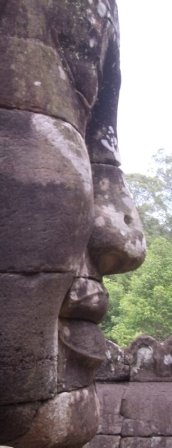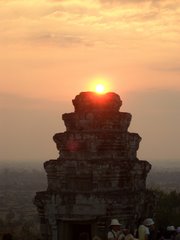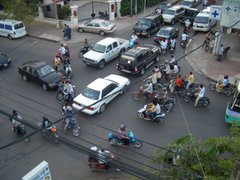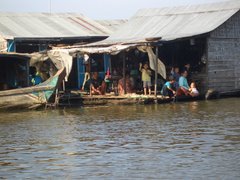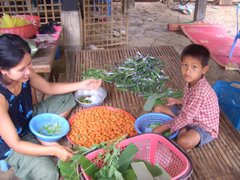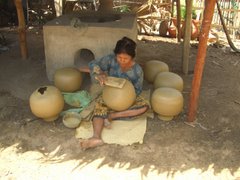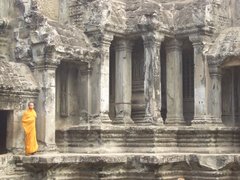Brushing teeth is a fairly simple maneuver, except its like camping out. One does not drink the water directly from the tap over here. So we have a two liter bottle of water just for that purpose. We boil about a half a gallon of water a day to kill any critters in the water and then pass all of it through a British Berkefield filter to back up the boiling. It’s really not a big deal, but you have to watch those old habits, like rinsing your brush under the tap after you’re done – darn!
The fruit here is fantastic. It’s mango season right now which is terrific. Nothing like a mango-banana-yogurt smoothie for breakfast. Or sometimes I’ll treat myself to a fresh hot baguette on my ride to work, a legacy of French colonialism. There’s a vendor I’ve gotten to know through my increasingly frequent purchases of his specialty. Now that I’m a regular he even smiles and always reaches under the top baskets of bread to give me one of the fresh hot ones. All for 500 Riel, or about 12.5 cents.
Work starts at 7:30am. We knock off at 12 and take a two hour lunch break. Lunch is a big thing here. Yesterday I went to a non-Western restaurant because the food is the best and it’s incredibly cheap. I had stir fried chicken with ginger and rice, along with iced tea, all for the incredibly steep price of one dollar. You do have to be aware though – only have cold drinks that have cylindrical ice cubes with a hole in the middle. They are made with purified water. You don’t have drinks with the 'other' ice. That's the sort of ice that is delivered on carts and sawed into chunks for each customer. I imagine this is what it would have been like back when people depended on the ice man for the real ice box. It's a way of life for many, many people, even in Phnom Penh.
Truth is that I live in a city of 2.4 million people and many things are different than the western world, but there are conveniences here that one would find in most big cities. But 80% of the population is rural and 35% live below the poverty line, which is $0.42 per day per person in the family. Most of the rural poor have no electricity except a car battery to run a simple light bulb after dark or maybe a black and white TV. That's a big maybe. There is no electric grid in Cambodia. Each city has its own power and then, in addition to car battery power, there are 660 RE's, or Rural Electric "companies", which consist of a diesel generator and lots of extension cords - literally - that run to the houses in the villages.

